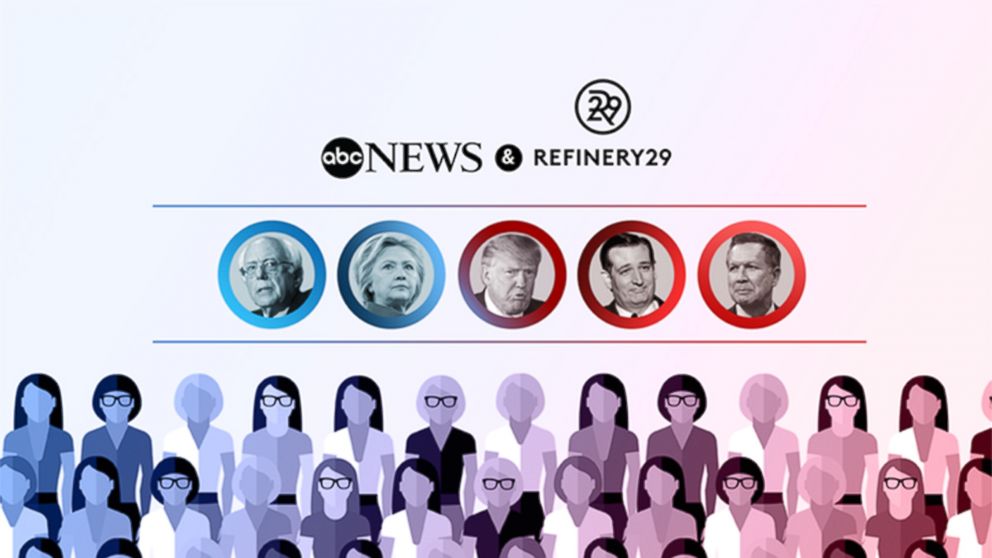2016 Race Sees Surge of Interest Among Millennial Women But Many Still May Not Vote, Poll Says
— -- The drama of this year's presidential election isn't lost on millennial women.
In a national poll conducted by ABC News and Refinery29 of women between the ages of 18 and 35, nearly half said that they were more interested in this election than they were in 2012.
Even that new level of interest isn't enough to ensure that they vote in November, however, since they don't seem crazy about any of the candidates and many find that the issues important to them are not being addressed.
Picking Their Person
The trend of young voters leaning Democratic appears to hold true, but that's not necessarily support that Hillary Clinton and Bernie Sanders can count too closely on.
In the poll, conducted from March 2-22, 38 percent of respondents identified as Democrats and 40 percent called themselves Independents. Some 16 percent called themselves Republicans.
Sanders was the most popular candidate among those polled, with the longtime Independent-turned-Democrat receiving 35 percent. Women didn't necessarily stick together in terms of political support, however, as Clinton received only 25 percent.
Getting Out the Vote
In spite of the increased interest in this year's election, that doesn't guarantee that the long-elusive youth vote will come out in droves.
Only 58 percent of respondents were certain that they would vote in the presidential election, while 12 percent said they probably would. More than a quarter of respondents said there was a 50-50 chance or less that they wouldn't vote in November.
The chances that millennial women actually show up on Election Day appear to go up with age as 52 percent of 18-21 year-olds are registered to vote but 72 percent of those 26 or older are already registered.
Fuzzy Feelings About the Candidates
At the time of the poll, there were five Republican candidates running but the crowd has thinned since. Of those who are still in the running, Donald Trump received the highest level of support with 8 percent, while Sen. Ted Cruz followed with 6 percent and Gov. John Kasich earned 2 percent.
The concepts of "hope" and "change" led to the inspiration of masses of young voters, but that same feeling doesn't seem to be around this year. Nearly half of all of the respondents didn't find any of the candidates inspirational.
When asked who they would want to have dinner with, Sanders and Clinton were selected 25 percent and 15 percent of the time respectively. Trump was the only Republican to hit double-digits (11 percent) on that question, with all the rest receiving less than 3 percent.
The largest group -- 39 percent -- said they wouldn't want to dine with any of the candidates.
When asked what candidates scared them, 63 percent of respondents answered Trump while 13 percent said Clinton. Sanders had 4 percent and Cruz 3 percent. Kasich was the only one of the bunch who didn't scare anyone.
Speaking to Their Interests
The surge in interest in the election, according to the women polled, doesn't necessarily mean that their interest comes from being targeted by the politician's talking points. The respondents were evenly split on whether or not the candidates are discussing issues that are important to them personally.
Economic inequality and student loan debt were the highest-ranked issues that are important to millennial women, when asked to rank issues beyond key policies relating to terrorism, the economy, health care and immigration.
Economic inequality and student loan debt were each top-ranked with 21 percent a piece, and protecting gun rights, equal pay, and preserving abortion access all received 11 percent of the vote a piece.




